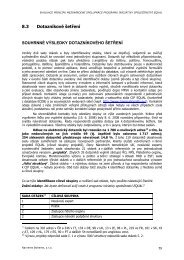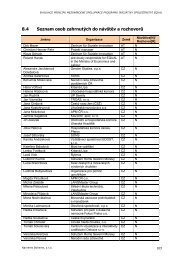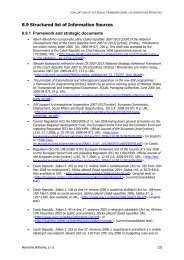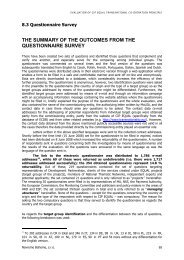EQUAL - Final report - eng - navreme
EQUAL - Final report - eng - navreme
EQUAL - Final report - eng - navreme
Create successful ePaper yourself
Turn your PDF publications into a flip-book with our unique Google optimized e-Paper software.
EVALUATION OF CIP <strong>EQUAL</strong> TRANSNATIONAL CO-OPERATION PRINCIPLE<br />
e.g. of the project or TCA). Reflection of these tools and the ability to use them for<br />
management and implementation of the transnational cooperation in the project were<br />
negligible.<br />
• Great part of the transnational partnership was implemented in “blocks”, the apex of which<br />
was always a joint meeting of a working group or only of an organisational team.<br />
Considerable part of the work in these blocks was carried out through e-mail exchange of<br />
documents in process. It was easy to classify the projects according to the groups<br />
participating in the international meetings – from managerial, research and creative groups<br />
(creating particular products, tools) to the projects focused of the “middle staff”, and in some<br />
cases also the target groups. The way of work and other related characteristics of the<br />
transnational cooperation differed thus a lot. Mutual compatibility of the individual national<br />
programmes was not a subject-matter of criticism; problems appeared from time to time due<br />
to unequal language knowledge.<br />
• Within the framework of the normal duties of the grant recipients, regular monitoring took<br />
place, which was used, however, above all as a formal tool for the individual financing stages<br />
and the content value and utilisation of which are minimal. Sometimes even considerable<br />
modifications discussed with the managing authority did not occur in the monitoring <strong>report</strong>s.<br />
• The project’s closure is a highly administratively demanding operation, which is, de facto, a<br />
separate phase requiring considerable drive – as a rule after factual termination of the<br />
transnational cooperation. Sometimes a problem is caused by the fact that not all partners<br />
close their projects at the same time and thus at the close of the project weakening of the<br />
transnational activities of those partners occurs, who have already finished their projects. The<br />
conditions for the project’s closure and detailed instructions were not, as a rule, handed over<br />
to the organisations sufficiently in advance.<br />
• The dissemination and mainstreaming stages shall be ensured within the framework of the<br />
final project activities, but due to all circumstances these activities sometimes fail to be<br />
completed till the project’s conclusion. After the project’s termination the organisations often<br />
do not have funds to maintain the employees, who were the specialists for implementation of<br />
the activities started within the framework of the <strong>EQUAL</strong> project; these often leave the<br />
organisation as of the date of the project’s closure.<br />
• As regards sustainability of the transnational cooperation, the organisations as a rule do not<br />
have own capacities and background that would enable to maintain and develop the created<br />
products and contacts.<br />
• As regards joint use of outputs from the projects, at the close of the project a part of the<br />
organisations turns to the managing authority with a request for political support in<br />
dissemination, e.g. at the meetings at the EU level. A part of the organisations turns to the<br />
managing authority after the project’s termination and they search for the funds to continue<br />
in distribution of the programme’s products, education of the target groups, product<br />
innovations and the like.<br />
• The information and communication background of the programme management and<br />
implementation was, within the framework of the Czech Republic, criticised by all the<br />
participating parties: the monitoring system was perceived rather as repression than as<br />
assistance, the databases of projects and partners were not updated regularly and an outline<br />
of the created products was missing completely. But at the same time both parties were<br />
learning during the programme implementation and they were improving these tools together.<br />
1.2 SELECTED FINDINGS<br />
• Preparation of the transnational partnership required from the part of methodological and<br />
information support of the managing authority above all information on partners and<br />
instructions, how to proceed at conclusion and a modification of partnership agreements.<br />
While the information support for the project preparation was sufficient, reliable records of<br />
modifications in the projects and the information on their outputs were missing completely in<br />
the databases kept at the central level.<br />
Navreme Boheme, s.r.o. 11











